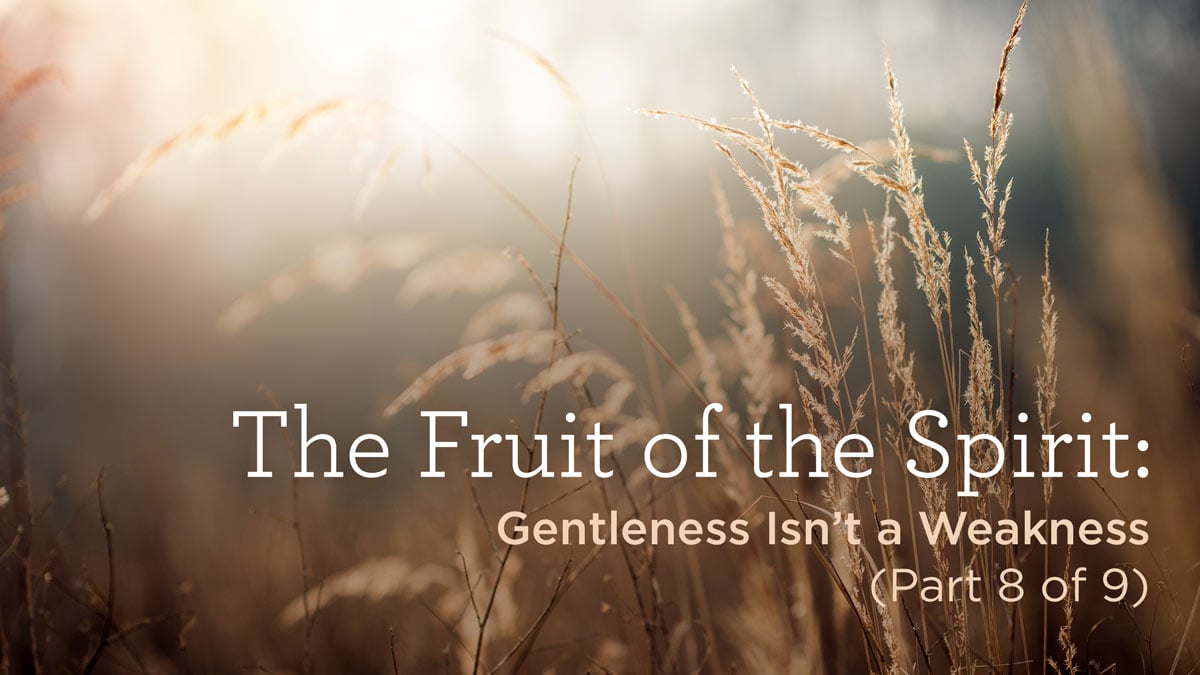
In 1839, George Washington Bethune, a Dutch Reformed pastor in the United States, observed, “Perhaps no grace is less prayed for, or less cultivated, than gentleness.”1 His words still ring true today. As Christians, we often lack the gentleness we desperately need. Indeed, we may hardly even notice its absence.
If we undervalue gentleness, or meekness, it’s likely because we misunderstand it. Perhaps we think of it as a sort of spinelessness or weakness, as if to be gentle or meek is to lie down and let others wipe their feet on us. But a better, more biblical way to think of gentleness is as strength under control. This is the gentleness the Scriptures describe in our triune God and in His servants, like the apostle Paul. It involves a Godward dimension of submission to the Lord in all of His Word and works, and it involves a human dimension in the consideration of others. Such humble strength is what God expects of and supplies to all His people.
The Sovereign, Gentle Shepherd
Gentleness is the very nature of Almighty God, who “heals the brokenhearted and binds up their wounds” (Ps. 147:3). Isaiah 40:10–11 gives us a picture of this powerful but nevertheless caring God:
Behold, the Lord GOD comes with might,
and his arm rules for him;
behold, his reward is with him,
and his recompense before him.
He will tend his flock like a shepherd;
he will gather the lambs in his arms;
he will carry them in his bosom,
and gently lead those that are with young.
God directs His untrammeled strength, authority, and sovereignty for the good of His people. He cares for every last one of His sheep—especially the most vulnerable. Those who have particular needs—“the lambs”—He gathers in His arm. It’s a wonderful and a compelling picture: our mighty, majestic God stooping down into our little lives and tending gently to our needs.
Gentleness is the very nature of Almighty God, who “heals the brokenhearted and binds up their wounds.”
Jesus, the image of the invisible God (Col. 1:15) and our premier model for everything good, also identified Himself as “gentle and lowly in heart” (Matt. 11:29). Though He “upholds the universe by the word of his power” (Heb. 1:3) and overturned tables out of righteousness indignation (Matt. 21:12; Mark 11:15), He is gentle enough to let the bruised reed stand and to allow the smoldering wick to remain lit (Isa. 42:3; Matt. 12:20). In common parlance, He wouldn’t hurt a fly. Never does this sovereign Shepherd speak words like “He’s useless, let’s get rid of him,” or “She doesn’t amount to much, she can go.” No, the one with all power and authority (Matt. 28:18) gently cares for those who are His own.
The Formidable, Gentle Apostle
We can also see biblical gentleness on display in the life of the apostle Paul. Before his conversion, Paul was a downright fearful figure, especially to the fledgling church. But he was transformed by the overwhelming power of the same Jesus he was persecuting (Acts 9:4–5). The work of the Holy Spirit in Paul’s life was then to produce the fruit of the Spirit, including gentleness.
Paul was no weakling. He knew where he stood. He had convictions. He could have hounded believers into obedience, as he had in his former life. But his gentleness flowed from his experience of God’s grace. He exercised his strength for the service of others in obedience to God. In describing himself to the Thessalonians, he said, “We were gentle among you, like a nursing mother taking care of her own children” (1 Thess. 2:7). He went from “breathing threats and murder” (Acts 9:1) to comparing himself to a mother who shows tender care to her baby!
Though He upholds the universe “by the word of his power” and overturned tables out of righteousness indignation, Jesus is gentle enough to let the bruised reed stand and to allow the smoldering wick to remain lit.
Paul turned to gentleness even in the face of opposition. He instructed Timothy, for example, that “the Lord’s servant must not be quarrelsome but kind to everyone, … correcting his opponents with gentleness” (2 Tim. 2:24–25). Elsewhere, when he explains the nature of discipline within the church, he says that people should be restored “in a spirit of gentleness” (Gal. 6:1). The God to whom we ultimately answer is not a bully. He doesn’t snuff us out. He responds to us with perfect gentleness. How, then, could the children of that King operate in any other way? It’s not an option!
Gentleness toward God
As we consider whether we bear the fruit of gentleness in our lives toward God, we should ask ourselves these three questions.
1. Do I have a teachable spirit?
The fruit of gentleness should be evident in the way we listen to the Word of God taught. James instructs us to “receive with meekness the implanted word, which is able to save your souls” (1:21). You won’t benefit from the Bible if you come with an argumentative spirit. You can sit for a thousand years and listen to the Bible taught, and it will be like water on a duck’s back, as rain on a tin roof. Receiving the Word with meekness means putting aside our self-sufficiency, our human strength, to receive something better.
2. Do I repent when confronted by the Bible?
None of us is perfect. We all make mistakes—and often big ones. And as John reminds us, “If we say we have no sin, we deceive ourselves, and the truth is not in us” (1 John 1:8). Meekness before God means acknowledging the insufficiency of our own strength to save us—in other words, acknowledging our need for the Savior. If we try simply to ignore or hide our sins, we will find that our fellowship with God is spoiled and that our usefulness for God is diminished. Unrepentance is a sure path to unfaithfulness and the stiffness that accompanies it.
3. Do I have a trusting faith?
Gentleness is not mainly developed in tranquility but cultivated through trials and difficulty. Many of the things that I don’t want to happen in my life are the very things that will make me the full-orbed person God wants me to be. I don’t want to be sick, I don’t want to be disappointed, I don’t want my heart to be broken—but sickness, disappointment, and heartbreak can help me submit to God and make me sensitive to others. God is committed to conforming His children to the image of His beloved Son. In trials, we can trust that He is making us like Jesus, in gentleness as in everything else.
Gentleness toward One Another
Gentleness toward one another means showing the kind of care and consideration that God in Jesus Christ has shown to us. And there are as many opportunities to show gentleness to others—as well as opportunities to plow over others in a spirit of anger or self-service—as there are minutes in the day.
As we consider whether we bear the fruit of gentleness in our lives toward others, we should ask ourselves:
- Am I considerate, generous, and fair in my dealings with others, or am I rigid, exacting, and demanding?
- Am I prepared to be sensitive to the pressures and insecurities of my friends, colleagues, and family?
- Do I show consideration to the people who serve me—the cashier, the customer service representative, the waiter or waitress?
- Do I tell myself I am standing on principle when I’m merely insisting on my own opinion?
- Am I becoming increasingly compassionate, genial, reasonable, and kind or increasingly crusty, unyielding, and inconsiderate?
When Peter instructs Christians to be “prepared to make a defense to anyone who asks you for a reason for the hope that is in you,” he says to do so “with gentleness and respect.” The reason? So that “those who revile your good behavior in Christ may be put to shame” by the goodness of our behavior (1 Peter 3:15–16). Our attitude toward friends and enemies alike, then, ought always to reflect the gentleness of Christ.
Slow, Organic Growth
With all of this in view, we must remember that gentleness is part of the fruit of the Spirit. We could easily become impatient about our lack of gentleness as we find we are not living up to the challenge of the questions above. But what we need is to turn our desperate frustration into a desperate dependence on the Holy Spirit to do the work He has promised. We need to cry out to Him, “Come, Holy Spirit. Dwell among us. Fill us and make us fruitful according to Your power at work in us. Do it for me, and do it for your church.”
We cannot take gentleness by force—by sheer, fist-clenching willpower. That would be a contradiction. It would be self-defeating. But when we come to God in a posture of dependence, He will be faithful to make the fruit of gentleness grow in our lives.
This article was adapted from the sermon “Gentleness” by Alistair Begg. Subscribe to get weekly blog updates as this series of new articles is published.
1 George Washington Bethune, The Fruit of the Spirit (Philadelphia, 1839), 100.
Topics: Articles
